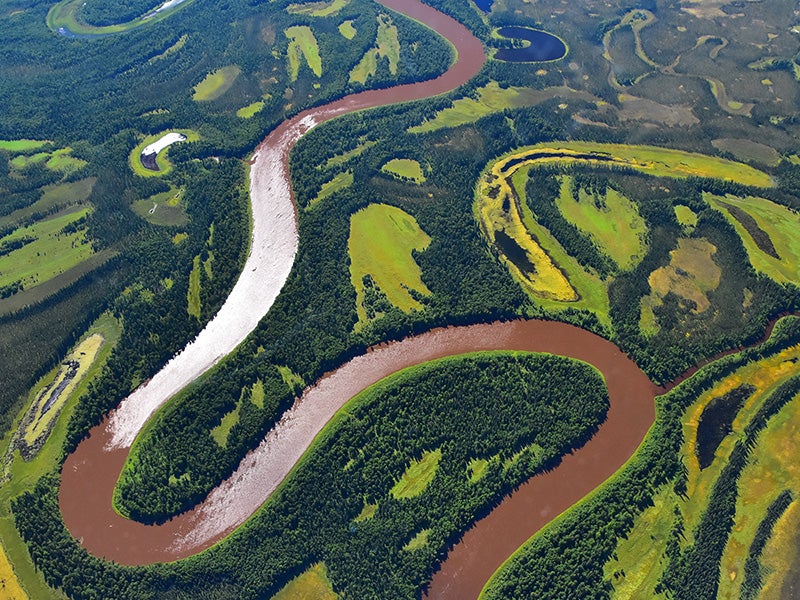Earthjustice stands with western Alaska tribes and families after severe storms devastated entire communities, displacing more than 1,000 residents just before winter. Learn more and how you can help.
Alaska Department of Natural Resources Remands Donlin Gasline Right-of-way Permit
Victory
—Tribes successfully challenge DNR’s approval for natural gas pipeline to fuel massive mining operation
Contact
Today, four Tribal Governments of the Yukon-Kuskokwim region agreed to dismiss a lawsuit against Commissioner Corri A. Feige of the Alaska Department of Natural Resources (DNR) and Donlin Gold LLC regarding the 315-mile natural gas pipeline for the Donlin Mine. The dismissal comes after Feige withdrew the right-of-way for the pipeline and agreed to conduct a complete analysis of the impacts of the pipeline and mine, as required by the Alaska Constitution.
President of Native Village of Eek, a Federally recognized Tribal Government, George Alexie says, “Our village opposes Donlin gold mine 100%, and we will stand our ground. The Kuskokwim River is our table, and it feeds our people throughout the year. If the Donlin mine goes through and our river is contaminated, the fish in it will be destroyed. The elders told us, ‘you won’t be able to eat money and it doesn’t burn good.’”
The State of Alaska remanded the original permit that had been issued on January 17, 2020, and has agreed to conduct a more thorough analysis of the impacts likely to affect Tribes and others from the proposed 315-mile long gas line from Cook Inlet to the Donlin mine site. Tribes were forced to sue the State to get DNR to comply with the law. This is the fourth time a state agency has admitted it issued a bad permit for the Donlin mine.
“In this age of uncertainty, one thing that the indigenous peoples of the Yukon and Kuskokwim can always count on to provide for our people is the land, as it has for so many generations. As long as our lands remain healthy and unpolluted, our people have security. This is why, along with other preparedness responses to the global COVID-19 pandemic, our Tribal Governments, along the Kuskokwim and Yukon Rivers, filed the legal challenge in our continuing effort to oppose Donlin Gold mine. In rural Alaska, our shelves will never be empty so long as we protect our waters and our land,” said Beverly Hoffman, a Tribal citizen of Orutsararmiut Native Council and community activist.
Background:
Located 10 miles north of the village of Crooked Creek in southwest Alaska’s Kuskokwim River headwaters, the Donlin project would be the world’s largest gold mine if allowed to proceed. Mercury pollution, a serious public health concern, is a particular threat from this mine due to its location in a “mercury belt.” The mine will also cause significant fish and wildlife habitat loss, and produce dangerous levels of arsenic, selenium, and other toxic metals in local waters. Residents of this area consume more king salmon per capita from the waters of the Kuskokwim than any other people on earth.
Acting on the principle that every Tribe’s responsibility is to protect its Tribe and its subsistence way of life, the four tribal councils, represented by the environmental law firm Earthjustice, collectively filed a lawsuit in Alaska Superior Court in Anchorage. The lawsuit challenged the decision by Commissioner Corri A. Feige of the Alaska Department of Natural Resources to approve the right-of-way for a 315-mile long natural gas pipeline from Cook Inlet to the Kuskokwim to fuel the mine. More specifically, the lawsuit alleged Commissioner Feige’s decision failed to consider the full impacts of the proposed Donlin Gold Mine to fish, wildlife, and water quality, in violation of the Alaska Constitution.
Many residents across the Yukon-Kuskokwim region practice a subsistence lifestyle, and see Donlin’s mining development as a major threat to this way of life. The mine will bring greatly increased barge traffic to the Kuskokwim River, which will harm habitat for salmon and smelt — fish the Yup’ik villages rely upon to meet basic dietary needs. It will also degrade water quality in the region’s abundant river system, possibly with accidental releases of mercury and other toxins that make fish unsafe to consume. The massive industrial operation will also destroy thousands of acres of wetlands and streams, create billions of tons of waste, cause permanently elevated levels of dangerous metals in local waters, require permanent water treatment, and pose an enduring threat to the communities who have subsisted in the region for millennia.
What Happened:
In March 2019, Tribes submitted comments to DNR, asking DNR to, among other things, address the cumulative impacts on fish, wildlife, and Tribes likely to flow from the proposed Donlin pipeline. On January 17, 2020, DNR issued the right-of-way permit for the permit, and ignored the Tribes’ comments. Tribes then asked DNR to reconsider its decision, and DNR denied that request.
In response to DNR’s failure to heed Tribal comments, Tribes were forced to file an appeal in Alaska Superior Court on March 19, 2020. The Tribes were represented by lawyers with Earthjustice, and they were joined in the appeal by Cook Inletkeeper.
On April 30, DNR abruptly changed course, retracting the right-of-way for the pipeline and agreeing to conduct an analysis of the cumulative impacts of the project, together with a new public process, as the Tribes requested. The State of Alaska has reversed course on other permits for the Donlin mine after public scrutiny, including permits for waste management, and water quality protection.

Additional Resources
About Earthjustice
Earthjustice is the premier nonprofit environmental law organization. We wield the power of law and the strength of partnership to protect people's health, to preserve magnificent places and wildlife, to advance clean energy, and to combat climate change. We are here because the earth needs a good lawyer.